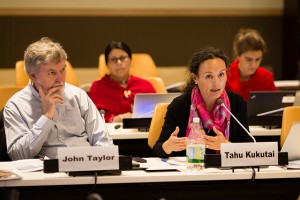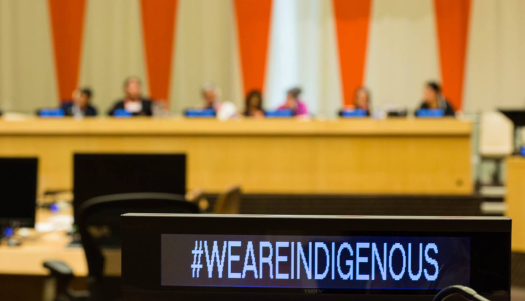
 A two-day expert group meeting on “Indigenous Peoples and Agenda 2030,” organized by the Division for Social Policy and Development of the Department of Economic and Social Affairs at United Nations Headquarters on 22-23 October, focused on developing strategic guidance and recommendations to mobilize action and support for including Indigenous issues in the implementation and monitoring of the 2030 Agenda for Sustainable Development.
A two-day expert group meeting on “Indigenous Peoples and Agenda 2030,” organized by the Division for Social Policy and Development of the Department of Economic and Social Affairs at United Nations Headquarters on 22-23 October, focused on developing strategic guidance and recommendations to mobilize action and support for including Indigenous issues in the implementation and monitoring of the 2030 Agenda for Sustainable Development.
“The Sustainable Development Goals present a step forward from the Millennium Development Goals where Indigenous Peoples were almost invisible,” said Joan Carling, member of the Permanent Forum on Indigenous Issues. “But some targets actually threaten our rights and make our lands subject to land grabs, unless special measures are put in place,” she emphasized.Some of the Sustainable Development Goals are considered by experts as potentially threatening to the rights of Indigenous Peoples. Goal 7, for example, which provides for ensuring access to affordable, reliable, sustainable and modern energy for all, could possibly be used as a justification for further energy development on the territories traditionally populated by Indigenous Peoples, without their consent. Indigenous Peoples’ advocates are therefore strongly arguing for the inclusion of indicators explicitly securing collective land rights for Indigenous Peoples.
“Indigenous Peoples’ rights to their traditional lands, territories and resources have to be secured as the fundamental basis for their economic development and foundation of their lives, livelihoods and cultures,” said the Chairperson of the Permanent Forum, Professor Megan Davis.
Another key concern for Indigenous Peoples, who are among the poorest and most marginalized people in the world, is the need for data disaggregation to compare the situation of Indigenous Peoples to other population groups. “Special measures and measurements are needed, if we should not again leave Indigenous Peoples behind,” said Victoria Tauli-Corpuz, the UN Special Rapporteur on the Rights of Indigenous Peoples. “For proper monitoring, we need disaggregated data and indicators that uphold Indigenous Peoples’ human rights,” she stressed.
But the new set of global goals also presents opportunities for Indigenous Peoples, such as the focus on reducing inequalities, fighting climate change, and the promise to “leave no one behind.”
“We see some hope, “said Paul Kanyinke Sena, the former Chairperson of the Permanent Forum on Indigenous Issues. “The Sustainable Development Goals are kind of inclusive and provide opportunities for Indigenous Peoples. The challenges – especially related to renewable energy and forestry projects — can be addressed through law and policy changes that take into account the rights of Indigenous Peoples.”
Commenting on the adoption of the Sustainable Development Goals, Professor Davis emphasized that, “Indigenous Peoples look forward to being part of this exciting journey, so it can truly transform our world and bring peace and prosperity for all.”
 Welcome to the United Nations
Welcome to the United Nations


